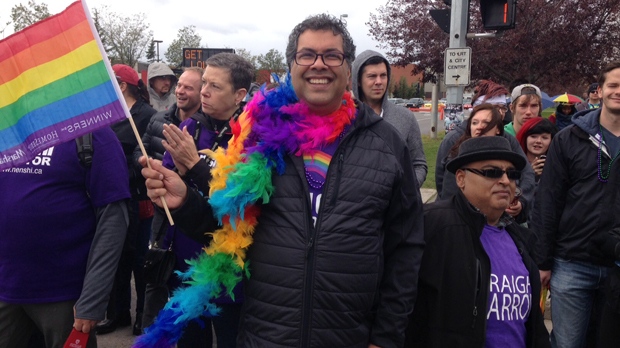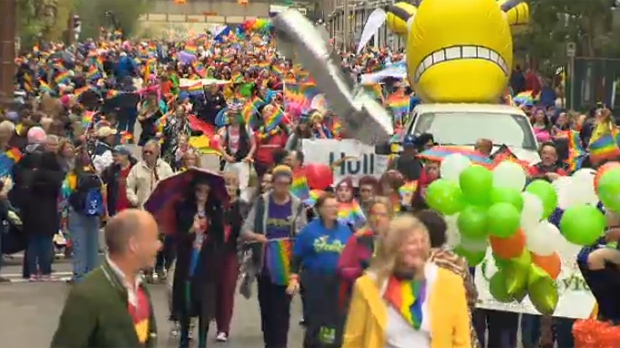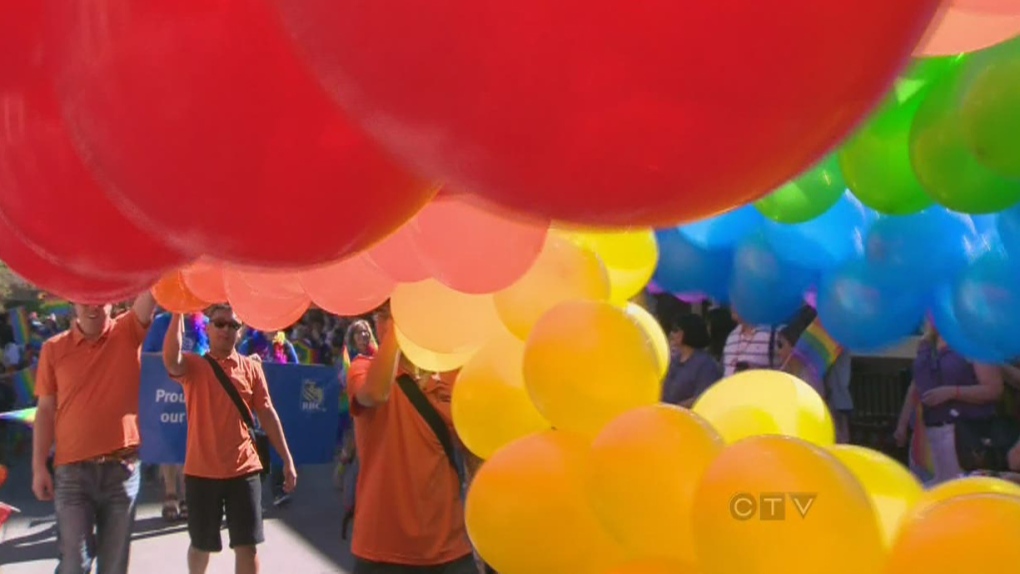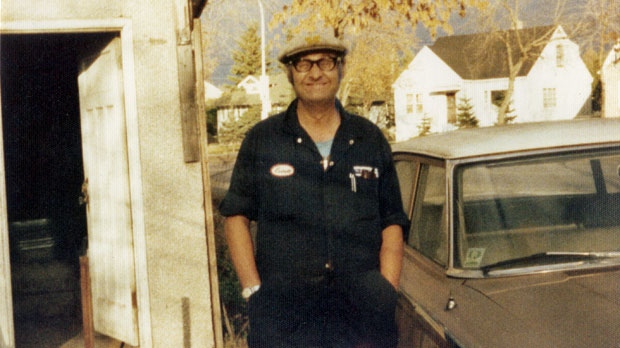A Prideful history with more work to be done
 June is Pride Month, with advocates calling for a return to the protest origins of Pride and a rejection of accepting partial LGBTQ2S+ visibility as success. Above, Roller Pride at
the 2013 Calgary Pride Parade.
June is Pride Month, with advocates calling for a return to the protest origins of Pride and a rejection of accepting partial LGBTQ2S+ visibility as success. Above, Roller Pride at
the 2013 Calgary Pride Parade.
June 1 marks the beginning of Pride Month, a celebration of LGBTQ2S+ people around the world.
The event commemorates the Stonewall Riots of 1969, which many consider to be a catalyst of the LGBTQ2S+ rights movement. The month-long festivities traditionally consist of speakers, concerts, film festivals and other LGBTQ2S+ cultural events, culminating in a large parade. This year marks the 31st anniversary of Calgary’s Pride parade; though, last year’s was cancelled due to the COVID-19 pandemic.
HISTORY IN CALGARY
Calgary held its first Pride festival in June of 1988 in order to fundraise to send athletes to the Gay Games, according to Calgary Pride. In June 1990, Calgary Lesbian and Gay Political Action Guild organized a rally to kick off the third Pride festival. At this march, many participants wore facial coverings. “People were really concerned back then with exposing their identity” as a member of the LGBTQ2S+ community, said Kevin Allen of the Calgary Gay History Project.
Until 1998, when the wrongful dismissal case of Edmonton man Delwin Vriend made its way to the Supreme Court of Canada, members of the LGBTQ2S+ community could be legally terminated from their jobs, denied housing and/or goods and services based on their sexuality, said the Calgary Gay History Project. The federal law was expanded to include gender identity in 2017.
 Mayor Nenshi elected to wear a parka and a rainbow boa to battle the cool weather during Sunday's Pride Parade
Mayor Nenshi elected to wear a parka and a rainbow boa to battle the cool weather during Sunday's Pride Parade
In 1991, the first official Pride parade was held in Calgary, and Mayor Al Duerr proclaimed June 16-23 “Gay Rights Week.” But the proclamation was short-lived, as pressure from the public and city councilors forced Duerr to quickly renege his acknowledgment of Pride. “There was a lot of AIDS panic and socially-conservative opposition to gay rights,” at the time says Allen. Still, the LGBTQ2S+ community continued to claim this week in June as Pride, as per Calgary Gay History Project.
In 2009, a decision was made by Pride Calgary to move the parade from June to September. Mayor Naheed Nenshi became for the first Calgary mayor to march in the parade in 2011, states Calgary Gay History Project. Last year, Pride was solely virtual due to COVID-19 restrictions, a move that demonstrated the LGBTQ2S+ community’s resilience, Allen wrote at the time.
 9 Avenue was transformed into a sea of smiling faces on Sunday for the 25th annual Calgary Pride Parade
9 Avenue was transformed into a sea of smiling faces on Sunday for the 25th annual Calgary Pride Parade
“Things have changed very quickly in Canada,” said Allen. But he stressed that this period of human rights violations in the LGBTQ2S+ community was not that long ago. “Many people in the gay community remember a time of oppression … I have first person memories of it,” he added. Allen also emphasized that there is still further work to be done when it comes to LGBTQ2S+ rights.
LOOKING FORWARD – WHAT IS STILL TO BE DONE
Pride “should not be a victory lap, but a call for further change,” said Victoria Bucholtz, co-founder of the Queer Education Foundation. “It is a stark reminder that no matter how far we have come, there is still lots to go and lots to do,” added Eddy Robinson of Skipping Stone, an organization for Transgender youth.
Advocates are calling for a return to the protest origins of Pride and a rejection of accepting partial LGBTQ2S+ visibility as success. “Pride lost its way for a long time,” said Bucholtz. “Pride was started as a protest against injustice and it shifted into visibility. And once that visibility was gained for certain populations there was a tendency to be like ‘OK our fight is done’ … visibility is great, but it has to come with rights and protections,” she added.

PERFORMATIVE ALLYSHIP
One of the calls to action is a push for corporations to go beyond what is known as “performative allyship,” says Robinson. They cite the overuse of the Pride flag by businesses in effort to appear LGBTQ2S+ friendly; yet in practice, these businesses fail to provide a safe workplace for their LGBTQ2S+ employees. “Calgary has a phenomenon called the corporate closet,” says Bucholtz. “There is a lot of members of the gender and sexually diverse community that for corporate pressure reasons aren’t as out as they would be in other cities,” she adds.
Advocates are also calling for acknowledgment and inclusion of the diversity within the LGBTQ2S+ community. "Often when we think of Pride and go to Pride, it is incredibly white," said Anda Fabrig, co-founder of the Queer Education Foundation. But "Pride [began as] a protest started by people of colour in New York;" specifically, transgender women, she said. Fabrig also emphasized that "Indigenous queer and two spirit people have been here before anyone else."
Emma Ladouceur of Outlink, a non-profit that supports the LGBTQ2S+ community and its allies, emphasized that the lack of racially diverse representation at Pride can lead to ostracization within the community. “If we are only thinking about our community in one very distinct context, then we are not meeting the needs of our community and we are leaving people out,” she said.
Overall, advocates hope Pride becomes more accountable to both its protest origins and the work that still needs to be done internally and externally to ensure the freedom of all LGBTQ2S+ people.
“Queerness is not fun and rainbows all the time,” and neither should Pride be," said Robinson. “We do deserve a celebration,” they add; “celebrations are important, but so is work.”
For advocates, including accountability in Pride does not take away from the celebration of identity the festival is known for. “Pride can be both of these things simultaneously,” said Ladoucer. “We can dance in the streets and we can also march.”
PRIDE 2021
This year, Calgary’s Pride parade will take place on September 6, following a week-long festival.
However, local LGBTQ2S+ organizations have also scheduled events for Pride Month. On June 5, 11 and 19, “Reading with Royalty” will take place virtually in partnership between Calgary Pride and the Calgary Public Library. The event will offer family-friendly story time led by local drag performers, said Calgary Pride. The Marda Loop Justice Film Festival is also running a double feature screening event showing films that celebrate the LGBTQ2S+ community in Canada on June 8 at 530 pm.
Coinciding with the Pride Festival later this summer, Calgary Gay History Project will be running walking tours where participants can learn about significant LGBTQ2S+ places and people in the city. Most notably is Everett Klippert, a Calgary bus driver whose wrongful incarceration for being gay led to the 1969 decriminalization of homosexuality.
 Everett George Klippert (Courtesy: Family of Everett Klippert)
Everett George Klippert (Courtesy: Family of Everett Klippert)
(Everett Klippert)
Further information on the Pride Festival beginning August 27 is still to come.
CTVNews.ca Top Stories

Canada's most wanted fugitive arrested in P.E.I. in connection with Toronto homicide
A suspect in a fatal shooting in Toronto’s east end last summer has been arrested in Charlottetown, just one week after he topped a list of Canada’s most wanted fugitives.
BREAKING Federal employees will be required to spend 3 days a week in the office
Starting in September, public servants in the core public administration will be required to work in the office a minimum of three days a week. The Treasury Board Secretariat says executives will need to be in the office four days per week.
Concerns about plexiglass prompt inspections at some Loblaws locations in Ottawa
Inspections are underway at more than one Loblaws location in Ottawa after complaints were filed about tall plexiglass barriers.
Plane overshoots runway at airport in St. John's, N.L., no injuries reported
Investigators from the Transportation Safety Board of Canada are headed to St. John's, N.L., after a plane overshot a runway at the city's airport this afternoon.
Poilievre unrepentant over calling Trudeau 'wacko' as his MPs say Speaker should resign
An unrepentant Pierre Poilievre returned to the House of Commons on Wednesday to pepper the prime minister about his drug decriminalization policies after being booted the day prior for refusing to take back calling Justin Trudeau 'wacko' over his approach to the issue.
Five human skeletons, missing hands and feet, found outside house of Nazi leader Hermann Göring
Archeologists have unearthed the skeletons of five people, missing their hands and feet, at a former Nazi military base in Poland.
Toddler of Phoenix first responder dies after bounce house goes airborne
A two-year-old child died after a strong gust of wind sent the bounce house he was in airborne and into a neighbouring lot in central Arizona, the Pinal County Sheriff's Office said.
NDP Leader Jagmeet Singh confirms his party will support the Liberals' federal budget
NDP Leader Jagmeet Singh says his party will support the federal budget, ending any speculation that the party could pull out of its deal with the minority Liberal government.
Dental care program accepting claims for 1 million seniors
Citizens' Services Minister Terry Beech says 1,200 seniors have already visited a dentist and had their claims processed by the federal government's new dental care plan.
































